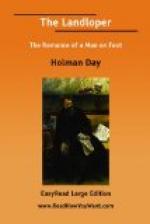“Who says so?” inquired the stranger, putting his back against the tree and stretching out his legs.
“I—Etienne Provancher.”
“And I—my worthy alien—I am Walker Farr from Nowhere. Now that we have been properly introduced I will sit here and rest. I am here because I love the soothing sound of babbling waters on a hot day. Go about your work. I’ll watch you. I love surprises. Who knows what next you’ll draw forth from the depths of fate?
“I can have you arrest!” cried the old man.
The uninvited guest took off his broad-brimmed hat, laid it across his knees, and ran his hand through his shock of brown hair; it curled damply over his forehead and, behind, reached down nearly to his coat-collar, hiding his tanned neck. In some men that length of hair might have seemed affectation. It gave this man, as he sat there uncovered, that touch of the unusual which separates the person of strong individuality from the mere mob. Then he smiled on old Etienne—such a warm, radiant, compelling, disarming sort of smile that the rack-tender turned to his work again, muttering. His mouth twitched and the crinkles in his withered face deepened.
Walker Farr found a comfortable indentation in the tree-trunk and settled his head there.
“How much do you get a week for doing that, Etienne?” he inquired, with cool assurance.
The old man glance sideways sharply, but the smile won him.
“Six dollaire.”
“After supporting your family, what do you do with the rest of the money these generous mill-owners allow you?”
“I never was marry.”
The young man looked up at the mill windows where childish heads were bobbing to and fro.
“That was poor judgment, Etienne. You might have married and have a dozen children now, working hard for you in the mill. Just like those children yonder.”
The old man came to the end of his foot-bridge and flung down his rake and his pike-pole.
The sudden emotions of his Gallic forebears swept through him. His features worked, his voice was high with passion.
“Ba gar, I don’t sleep the night because I think about dem poor childs. Dem little white face, dem arm, dem leg—all dry up—not so big as chicken leg. And all outdoor free to odder childs—not to them childs up dere.” He shook his fists at the mill windows. And some child who saw the motion, getting a hasty peep from a widow, squealed, “Hi yi, old Pickaroon!”
“It doesn’t pay to get too excited over the sorrows of the world, my friend,” drawled the young man under the tree. “It doesn’t do any good; and then somebody calls you names. I was something like you once. But I’ve changed my philosophy. I have hypnotized my altruism. Now I’m perfectly happy.”
Etienne stared without understanding these big words. But he had often told himself that he never expected to understand Yankee speech very well. He worked alone; he lived alone in his garret in the tenement block; he talked but little with any person. But this young man with the wonderful smile seemed to inspire him to talk—even to the extent of revealing his secrets.




